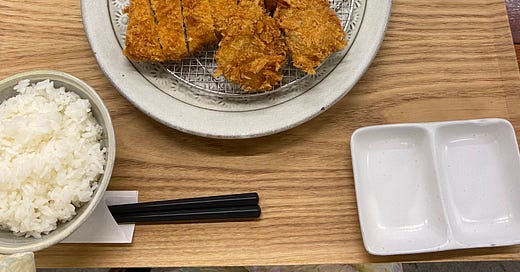⬆️⬆️This is at normal speed. First, try listening and see if you can understand.
Your 5-Minute Weekly Real Chat Lesson 1: どハマり中
Today's lesson, a phrase I want you to remember, どハマり中, meaning “I'm completely obsessed with it.”
Let's practice it phrase by phrase!
今更(いまさら)なんだけどさ、どハマりしてるものがあって。。。
Ima sara nan da kedo sa, do hamari shiteru mono ga atte
“I know it's kind of late, but there's something I'm completely hooked on...”
***Vocabulary: "今更(いまさら)" in Japanese translates to "too late," "belated," or "now" in English. It refers to realizing or taking action on something later than expected or later than it should have been. For example, "今更(いまさら)謝(あやま)っても遅い" translates to "It's too late to apologize now" in English. This expression is used in situations where someone has come to a realization or taken action after a significant delay.
なになに?
Nani nani?
“Oh, really? What's that?”
ワンピース、まさかハマるとは!毎晩号泣(まいばんごうきゅう)、ヤバいんだよ!
Wanpīsu, masaka hamaru to wa! Maiban gōkyū, yaba inda yo!
“One Piece. I can’t believe I'm totally into it! I'm tearing up every night, it's becoming a problem!”
***Vocabulary: 号泣(ごうきゅう)"号泣" in Japanese translates to "weeping" or "sobbing" in English. It refers to the act of shedding tears while experiencing strong emotions, often associated with sadness or intense feelings.
マジー??あれって、小学生(しょうがくせい)とかが読(よ)む漫画(まんが)じゃないの!?いい年(とし)した大人(おとな)が。。。
Majī?? Are tte, shōgakusei toka ga yomu manga janai no!? Ī toshi shita otona ga.
“No way?! Isn't that a manga kids like elementary school students read? You are the grownup adult…”
***Vocabulary: In Japan, people often use the phrase 'いい年したおとなが,' which roughly translates to 'a grown-up person.' Japanese culture tends to be quite age-conscious. Unlike in the United States, where age isn't a big deal when starting something new – like going to college in your 30s or 40s – in Japan, if you do something unexpected for your age, you might hear something like, 'You're a full-fledged adult, so isn't that a bit odd?' For example, if someone in their 40s decides to attend college, they might get surprised reactions like, 'You're a mature adult, and now you're suddenly a college student?'
So, in Japan, there's this unwritten expectation about how adults should behave, and it can come across as a bit strange to foreigners.
いや、まさに、小学生の息子がネットフリックスで見てて、ちょっと一緒に見てたら、いつの間にか息子よりどハマりしちゃって。。。
Iya, masa ni, shōgakusei no musuko ga nettofurikkusu de mitete, chotto issho ni mitetara, itsu no ma ni ka musuko yori do hamari shichatte..
“Well, exactly. My elementary school-aged son was watching it on Netflix, and when I watched it with him for a bit, before I knew it, I was way more hooked than he was...”
で、毎晩(まいばん)泣(な)いてんだ?
De, mai-ban naite nda?
“So, you are crying every night?”
ちょっと、馬鹿(ばか)にしてるでしょ。みてみてよ。絶対(ぜったい)はまるから!!
Chotto, baka ni shiteru desho. Mite mite yo. Zettai hamaru kara!
“Hey, are you making fun of me? Then watch it. You'll definitely get hooked!"
***Vocabulary: The expression "馬鹿にする" (baka ni suru) is usually about making fun of someone, but it doesn't necessarily mean you're being mean. When you're talking with friends or family, it can be used in a joking or not-so-serious way, like teasing or messing around with each other.
Okay, the lesson is finally done! Now it's quiz time!
How do you say in Japanese the act of shedding tears while experiencing strong emotions, often associated with sadness or intense feelings?
***English below of Japanese.
はーい、いかがでしたでしょうか!第一回目、正直めっちゃ大変でした。ニュースレターなんてやった事ないし、全部はじめての試みで、かなりまごついたけど、皆さんのためになりそうなら、続けていきます!これからもっといろんな日本のおすすめスポットとか、食べ物とかも紹介していけたらな、と思うので、よかったらぜひお友達にもおすすめしてくださーい!そうしてくれたらすっごく助かるし、励みになる!じゃ、今日の音声ファイル、寝る前に、朝に、いろんなところできいて、練習してね!ではでは、また来週!
How was it…? The first episode was honestly quite challenging. I've never done a newsletter before, and everything was a brand new experience for me, so I stumbled quite a bit. But if my content like this will be helpful to all of you, I'll keep going! I hope to introduce more recommended places and foods from Japan in the future, so please recommend my newsletter to your friends if you can! It would be a great help and motivation for me to keep creating contents! Make sure please listen to today's audio file before going to bed, in the morning, or wherever you can, and practice! See you next week! Matane!





This is REALLY good! すごくわかりやすくて, 内容や説明などがとても良いと思います。
たくさん勉強になりました。次のニュースレターを本当に楽しみにしています。
すごい、むむさん!いいチャレンジでした。
ありがとうございました。たくさん勉強なりました。